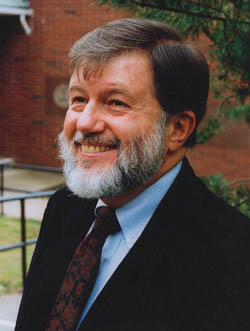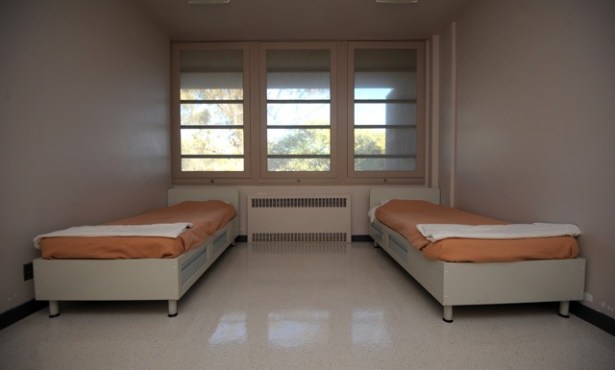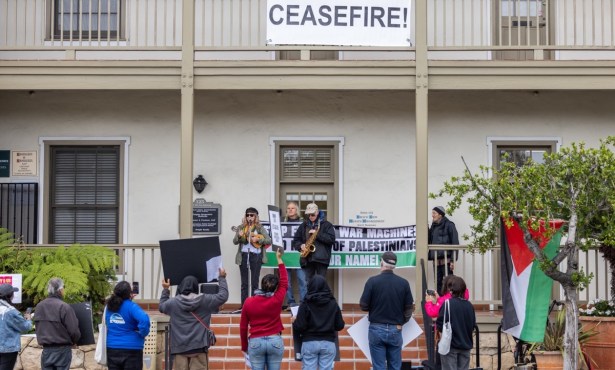Anti-Torture Leader Speaks in Santa Barbara
Holy Hell
The Reverend George Hunsinger, a Presbyterian minister and chair of systematic theology at Princeton Theological Seminary, will participate in a panel discussion on torture this Friday, May 18, at UCSB’s MultiCultural Center, a continuation of the university’s six-month-long symposium on torture. Hunsinger speaks compellingly about torture’s effects on the human psyche and national soul. He believes that allowing torture as policy desensitizes people to the suffering of others. “The people in power today are trying to break a part of our ethical backbone and make us insensitive to these terrible human rights abuses that are taking place.” he said.

Hunsinger sparked the formation of the National Religious Campaign Against Torture (NRCAT) last year, after he realized that the country’s religious communities hadn’t and weren’t publicly responding to the news that U.S. forces were torturing detainees in Iraq’s Abu Ghraib prison and at Guant¡namo Bay in Cuba. Having been involved in anti-torture campaigns in the 1980s, Hunsinger was especially attuned to the issue and found the silence deafening. He never expected the array of voices that would soon answer his call.
When organizing NRCAT’s founding conference, Theology, International Law, and Torture: A Conference on Human Rights and Religious Commitment, which took place in January 2006, Hunsinger recounted, “Initially I was focusing mainly on the churches, but then Rabbis for Human Rights found out about us, and I thought ‘Well, we’ll have the conference and then find a way of working with them.’ But they said ‘No, we want to be at the conference.’ So I had to figure out a way to schedule Shabbat services for them. Then the Islamic Society of North America said ‘Hey, we want to be a part of this too,’ so I had to figure out a way for them to have their daily times of prayer. The conference schedule really didn’t look the same from one day to another for a six-week period.” By the conclusion of the conference, however, this unusually diverse group of American religious leaders had all united around a concise six-sentence statement of conscience titled Torture Is a Moral Issue, which was published last June as a full-page advertisement in the New York Times. “We’re a fledgling organization, but getting this diversity has been very exciting,” Hunsinger said.
That founding conference officially launched an organization that now has 46 participating members and 67 endorsing members. Mostly these are small- to medium-sized faith communities sprinkled across the country, including one in Santa Barbara, as well as national church offices. On Saturday morning, Hunsinger will address parishioners at the NRCAT-affiliated Trinity Episcopal Church, at State and Micheltorena streets.
“The fact that we have television programs now in which torture is glorified and taken for granted is alarming not only to citizens who care but even to West Point and the military,” insisted Hunsinger. According to the reverend, the organization Human Rights First is bringing the producer of the Fox television show 24 to West Point to discuss how its depiction of torture is giving young recruits wrong ideas. “Experts in interrogation agree these tactics don’t work and are in fact counterproductive. The organization Al Qaeda actually began in the torture chambers of Egypt, as you can read in the opening pages of The Looming Tower, which is a history of Al Qaeda.”
NRCAT is pushing the campaign “Ten Steps to Restore the United States’ Moral Authority.” It’s also advocating passage of the Restore the Constitution Act (S 576), which would rescind provisions of the Military Commissions Act that redefine torture to allow practices like waterboarding, induced hypothermia, and sexual humiliation. Next month, 100 NRCAT-affiliated congregations will screen Rory Kennedy’s documentary Ghosts of Abu Ghraib and hold a discussion afterward. For more information, visit nrcat.org.
Editor’s Note: Ghosts of Abu Ghraib shows at UCSB’s Campbell Hall on Wednesday, May 23, at 7 p.m. as part of the university’s Torture and the Future critical issues series. For more information, go to complit.ucsb.edu/projects/tortureandthefuture.



